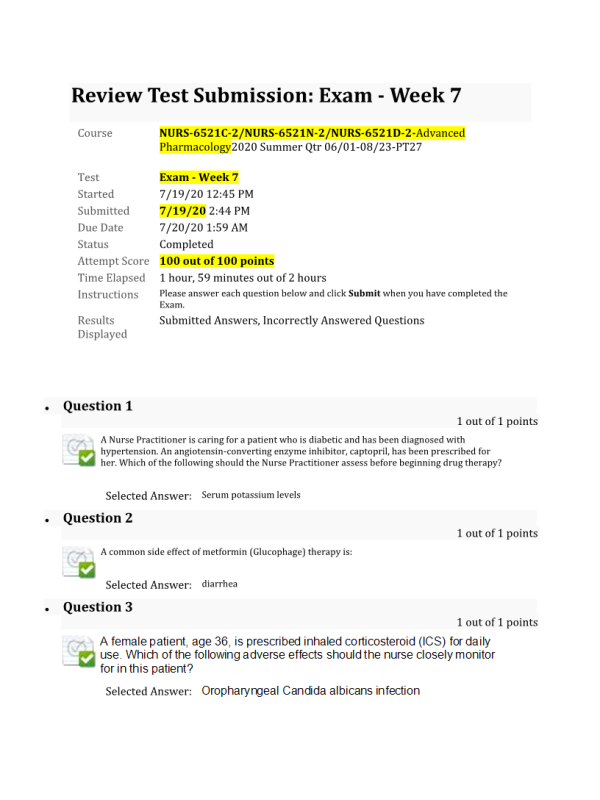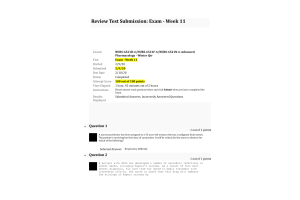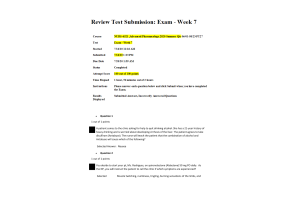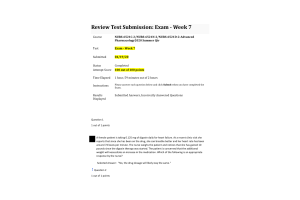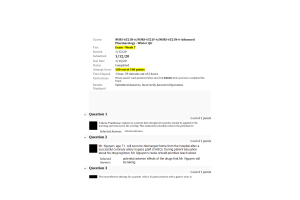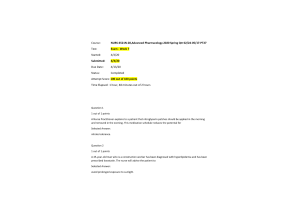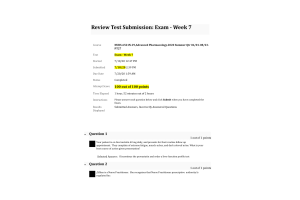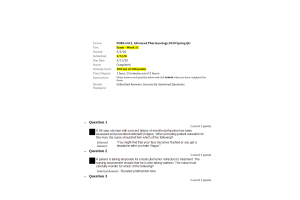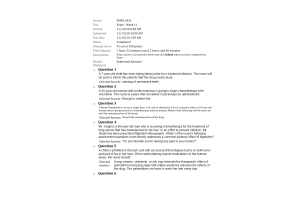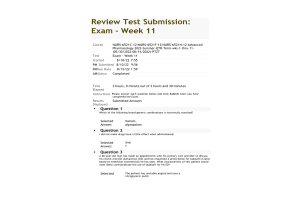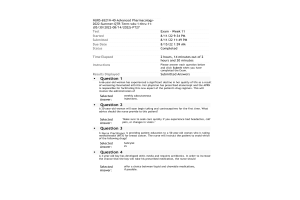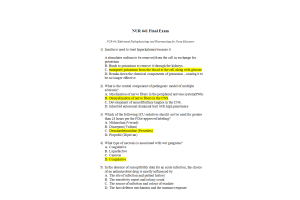NURS 6521C-2, NURS-6521N-2, NURS-6521D-2 Exam - Week 7 Midterm; 100 out of 100 Points
- $49.00
NURS 6521 Advanced Pharmacology
- Question: A Nurse Practitioner is caring for a patient who is diabetic and has been diagnosed with hypertension. An angiotensin-converting enzyme inhibitor, captopril, has been prescribed for her. Which of the following should the Nurse Practitioner assess before beginning drug therapy?
- Question: A common side effect of metformin (Glucophage) therapy is:
- Question: A female patient, age 36, is prescribed inhaled corticosteroid (ICS) for daily use. Which of the following adverse effects should the nurse closely monitor for in this patient?
- Question: The recommended range for maintaining serum theophylline levels is:
- Question: A Nurse Practitioner is conducting an assessment of a patient who has recently had several changes made to her drug regimen. What assessment question most directly addresses the safety implications of the patient's drug regimen?
- Question: Which antihypertensive agent is associated with hair growth?
- Question: The Nurse Practitioner is preparing to Prescribe a medication regimen for her patient. He or she recognizes that criteria for choosing an effective drug for any disorder include:
- Question: A Nurse Practitioner is caring for a 73-year-old man who is receiving drug therapy. He is beginning to exhibit signs of decline in his renal system, yet his current serum creatinine level is normal. The Nurse Practitioner will base the patient's plan of care on the understanding that there is
- Question: During a clinic visit, a patient complains of having frequent muscle cramps in her legs. The nurse's assessment reveals that the patient has been taking over-the-counter laxatives for the past 7 years. The nurse informed the patient that prolonged use of laxatives
- Question: A patient comes to the clinic asking for help to quit drinking alcohol. She has a 21-year history of heavy drinking and is worried about developing cirrhosis of the liver. The patient agrees to take disulfiram (Antabuse). The nurse will teach the patient that the combination of alcohol and Antabuse will cause which of the following?
- Question: Which effect does the Nurse Practitioner expect may occur when using cholinergic agonists?
- Question: Which of the following is a potential adverse side effect of autonomic-anticholinergic agents?
- Question: Ms. Simpson has a known history of asthma. She is on Theophylline daily. The NP contemplates giving her an antibiotic for her respiratory infection. The NP knows that which choice below could elevate theophylline levels?
- Question: Some first-generation antihistamines are used:
- Question: When prescribing an antihypertensive medication for a type 2 diabetic patient, the drug classifications that would tend to reduce insulin sensitivity are:
- Question: Glargine (Lantus) is an insulin analog that essentially has no peak and is usually administered:
- Question: The side effects of antihistamines are mostly due to their:
- Question: Autonomic drugs have little effect when administered:
- Question: The point in time on the drug concentration curve that indicates the first sign of a therapeutic effect is the
- Question: A 76-year-old woman has a complex medical history that includes emphysema, osteoporosis, malnutrition, and hypothyroidism. Recently, the woman fell outside her home as a result of weakness and suffered a fracture to her femoral head. The woman's subsequent hip-replacement surgery has been scheduled and the care team recognizes that the use of isoflurane will be most significantly influenced by
- Question: Which of the following statements best defines how a chemical becomes termed a drug?
- Question: Glucocorticoids affect the metabolism of carbohydrates, protein, and fats.
- Question: A patient with a known history of benign prostatic hyperplasia (BPH) presents to the clinic 4 days after developing a cold. He tells you he began experiencing a sore throat and nasal congestion and began to take an over the counter decongestant. Today, he complains of not urinating over the last 12 hours. He also has suprapubic fullness on exam. Which of the following medications are most likely responsible for this patient's urinary retention?
- Question: What drug class will decrease the facial flushing that occurs with niacin?
- Question: The Elderly are at high risk of Adverse Drug Reactions due to:
- Question: Biguanides control hyperglycemia in type 2 diabetes primarily by acting at which organ?
- Question: A 39 y/o female is diagnosed with Graves disease. She also has a small goiter =. Her symptoms are not deemed to be severe and propylthiouracil is prescribed. Whare is the most serious potential adverse effect of this medication?
- Question: Which medication class is recognized for the treatment of moderate to severe dementia?
- Question: The nurse practitioner has prescribed elemental iron 6 mg/kg/day in three divided doses for a toddler diagnosed with iron-deficiency anemia. What instructions would the family nurse practitioner include for the parents?
- Question: A patient who is a steroid-dependent asthmatic is started on a beclomethasone inhaler. Which should be part of patient education?
- Question: A 66-year-old woman has a complex medical history that includes poorly-controlled type 1 diabetes, renal failure as a result of diabetic nephropathy and chronic heart failure (CHF). Her care provider has recently added spironolactone (Aldactone) to the woman's medication regimen. The nurse should consequently assess for signs and symptoms of
- Question: A 65-year-old male presents with a history of worsening urinary urgency, frequency, and hesitancy. He also tells you that he has to "push really hard" to urinate and that his urine dribbles a little after he is done urinating. What medication should be avoided
- Question: Successful treatment for an adult patient with Helicobacter pylori (H. pylori)-induced peptic ulcer disease requires therapy with which regimen?
- Question: Which can elevate theophylline levels?
- Question: Your patient is on Atorvastatin 40 mg daily, and presents for their routine follow up appointment. They complain of extreme fatigue, muscle aches, and dark colored urine. What is your best course of action given presentation?
- Question: A patient has been started on a treatment regimen that includes levothyroxine. Select the dosage regimen that is most appropriate for a mean replacement dosage. The patient has been started on a treatment regimen that includes levothyroxine. Select the dosage regimen that is most appropriate for a mean replacement dosage.
- Question: You decide to start your pt, Ms. Rodrigues, on spironolactone (Aldactone) 50 mg PO daily. As the NP, you will instruct the patient to call the clinic if which symptoms are experienced?
- Question: What is a serious side effect of ibuprofen in the older adult patient?
- Question: Drugs that use CYP 3A4 isoenzymes for metabolism may:
- Question: A physician has ordered subcutaneous injections of morphine, a narcotic, every 4 hours as needed for pain for a motor vehicle accident victim. The nurse is aware that there is a high abuse potential for this drug and that it is categorized as a
- Question: Jillian is a Nurse Practitioner. She recognizes that Nurse Practitioner prescriptive authority Is regulated by:
- Question: A male patient who is hypertensive takes Hydrochlorothiazide for his blood pressure . He presents with red, painful swelling of the great toe. In addition to treating gout, you recognize that you may need to:
- Question: Mr. Lastinger was prescribed warfarin sodium (Coumadin). You advise him to avoid eating large amounts of leafy green vegetables because:
- Question: Acetazolamide is categorized as which of the following?
- Question: The anticoagulant drug that acts as a vitamin K antagonist is:
- Question: A patient in need of myocardial infarction prophylaxis has been prescribed sulfinpyrazone for gout. Which of the following will the nurse monitor the patient most closely for?
- Question: Classes of medications typically used to treat hyperthyroid conditions include:
- Question: Which mechanism of platelet inhibition is exhibited by aspirin?
- Question: Which of the following serves to protect the public by ensuring the purity of a drug and its contents?
- Question: A clinic Nurse Practitioner is planning care for a 68-year-old man who has been on omeprazole (Prilosec) therapy for heartburn for some time. Regarding the patient's safety, which of the following would be a priority nursing action?
- Question: A female patient is taking 0.125 mg of digoxin daily for heart failure. At a recent clinic visit she reports that since she has been on the drug, she can breathe better and her heart rate has been around 74 beats per minute. The nurse weighs the patient and notices that she has gained 10 pounds since the digoxin therapy was started. The patient is concerned that the additional weight will necessitate an increase in the medication. Which of the following is an appropriate response by the nurse?
- Question: A patient is recovering from an acute episode of thrombophlebitis and is being treated with warfarin (Coumadin) 5 mg PO daily. In reviewing medication information, the Nurse Practitioner would include what information in their teaching?
- Question: 60-year-old male presents to your office with a history of seizure disorder. The patient states that he has been taking valproic acid. Which of the following is a known potential adverse effect of valproic acid?
- Question: Mr. Johnson is an 80 year old male who is on Digoxin therapy. The Nurse Practitioner knows they should monitor the older adult patient for which of the most common adverse reactions of digoxin?
- Question: Which of the following can block the action of heparin?
- Question: A Nurse Practitioner is discussing with a patient the efficacy of a drug that his physician has suggested, and he begin taking. Efficacy of a drug means which of the following?
- Question: To minimize the risk of adverse effects of glucagon when given to an unconscious diabetic patient, as the patient regains consciousness, the nurse should
- Question: An adult male comes to the clinic with complaints that he is experiencing increased difficulty breathing over the past few days. He has a history of asthma and coronary artery disease. He was recently diagnosed with hypertension. Examination reveals no jugular vein distention and no productive cough. Breath sounds are present, but expiratory wheezes are noted bilaterally, and he denies any chest pain. His vital signs are pulse of 74 beats/min, respirations of 32 breaths/min, and BP of 160/100 mm Hg. His current medications are albuterol (Proventil) inhaler 2 puffs every 4 hours prn for wheezing, nitroglycerin transdermal patch, and propranolol (Inderal) 60 mg PO bid. What is the best treatment for this patient?
- Question: A patient with type 1 diabetes has been admitted to the hospital for orthopedic surgery and the care team anticipates some disruptions to the patient's blood glucose levels in the days following surgery. Which of the following insulin regimens is most likely to achieve adequate glycemic control?
- Question: Which of the following conditions is a contraindication for pioglitazone (Actos).
- Question: The Family nurse practitioner prescribed losartan 50 mg PO daily for a hypertensive patient. This medication promotes vasodilation by:
- Question: A patient has a history of tonic-clonic seizures that have been successfully treated with phenytoin (Dilantin) for several years. Phenytoin achieves a therapeutic effect by
- Question: The Nurse Practitioner is teaching a patient about the role of medications in the treatment of asthma. Which statement by the patient would require further teaching?
- Question: Which of the following oral medications is the safest to use during pregnancy?
- Question: A Nurse Practitioner is providing care for a patient who suffered extensive burns to his extremities during a recent industrial accident. Topical lidocaine gel has been ordered to be applied to the surfaces of all his burns in order to achieve adequate pain control. When considering this order, the Nurse Practitioner should be aware that
- Question: Ginger, a 25 year old female presents at the clinic with known history of depression. She reports taking an SSRI with only partial relief. Which of the following drugs can be used safely at any dose in conjunction with an SSRI?
- Question: Jillian is a Nurse Practitioner. She recognizes that Nurse Practitioner prescriptive authority Is regulated by:
- Question: Which of the following is a contraindication for antimuscarinic drugs?
- Question: Which of the following statements accurately describes digoxin?
- Question: The APRN's ability to prescribe controlled substances is regulated by:
- Question: A 34-year-old male patient is prescribed methimazole (MMI). The Nurse Practitioner will advise him to report which of the following immediately?
- Question: Metformin (Glucophage) acts by:
- Question: The NP is examining a 34-year-old obese man with a body mass index (BMI) of 35 who complains of almost daily indigestion and heartburn for the past year with a strong acid taste in the mouth about an hour after meals, and frequent belching and awakening at night with choking. The history is negative for chronic illnesses and alarm symptoms. A diagnosis of gastroesophageal reflux disease (GERD) is made. What is the best initial treatment for the patient?
- Question: Which of the following is a side effect or precaution associated with ACE inhibitors?
- Question: A patient on valproic acid may experience which of the following symptoms?
- Question: The first drugs typically used to treat the symptoms of an allergic reaction or allergic rhinitis are:
- Question: A male patient is to begin glyburide (Diabeta) for type 2 diabetes. Before the drug therapy begins, a priority action by the nurse will be to assess the patient's
- Question: The family of a Parkinson’s patient brings him to the clinic because he is experiencing increasing difficulty with ambulation. The family nurse practitioner increases the patient’s dose of carbidopa (25 mg)/levodopa (100 mg) (Sinemet 25–100 mg) from three to four times daily. What is important for the family nurse practitioner to teach the family regarding the increase in the dose of this medication?
- Question: The NP knows that lithium levels should be measured while patients are on lithium therapy. The NP also recognizes that lithium has a
- Question: Mr. Penny, age 67, was diagnosed with chronic angina several months ago and has been unable to experience adequate relief of his symptoms. As a result, his physician has prescribed ranolazine (Ranexa). Which of the following statements is true regarding the use of ranolazine for the treatment of this patient's angina?
- Question: Some first generation antihistamines are used:
- Question: You are seeing a 65 year old male with a long history of COPD who has recently developed hypertension. Which class of antihypertensive agents should the Nurse Practitioner avoid for this patient?
- Question: Typical adverse reactions to oral calcium-channel blockers include:
- Question: Ms. Neely was placed on fluoxetine about 8 weeks ago and is doing well on the medication. When initially prescribed the medication, she asks you about the common side effects of this type of medication. Which choice below is correct?
- Question: Typical adverse reactions to oral calcium-channel blockers include:
- Question: Advanced practice nurse prescribing of scheduled medications is affected most by:
- Question: The Nurse Practitioner is following up on a patient who is experiencing acute asthma problems. Albuterol (Proventil) by metered-dose inhaler (MDI) has been ordered as treatment. Which patient response would indicate to the family nurse practitioner that the patient understands how to take the medication?
- Question: A primary therapy for patients with mild ulcerative colitis is:
- Question: A possible side effect from the use of nifedipine (Procardia XL) is:
- Question: A mother brings her 4-year-old child, who is vomiting and has a temperature of 103°F into the emergency department (ED). The ED physician orders acetaminophen (Tylenol) for the fever. The best form of Tylenol to give the child, considering her presentation, would be
- Question: How does cholestyramine lowers blood cholesterol?
- Question: Susie is a 40 year old female with Type 2 Diabetes. She reports that over the last several days, she has been having some hypoglycemic episodes and feels it is related to medication. Her medication list is as follows:
- Question: All of the following agents are used to control the inflammatory changes seen in the lungs of asthmatics except:
- Question: Which type of antihistamines are used to inhibit the secretion of gastric acid in patients with gastrointestinal disorders?
- Question: A patient with a history of bronchial asthma is seen in the clinic for increased episodes of difficulty breathing. He has been taking theophylline 100 mg PO tid. He is 40 years old and obese with an 16-pack-year history of cigarette smoking and excessive intake of coffee daily. He eats a low-carbohydrate, high-protein diet. Which identified factors decrease the therapeutic effects of the theophylline?
- Question: Mr. Contreras is a 64-year-old patient with Type 2 diabetes. He has recently been diagnosed with hypertension. Which antihypertensive drug is the recommended choice to treat hypertension in patients with diabetes?
- Question: What is associated with chronic overtreatment with levothyroxine (Synthroid)?
- Question: A 24-year-old factory worker has been prescribed guaifenesin for the first time. Which of the following will be a priority assessment by the nurse before the patient's first dose?
- Question: A 39 y/o female is diagnosed with Graves disease. She also has a small goiter =. Her symptoms are not deemed to be severe and propylthiouracil is prescribed. Whare is the most serious potential adverse effect of this medication?
- Question: What information would the Nurse Practitioner include in teaching a patient about the treatment of vitamin B12 deficiency following a total gastrectomy?
